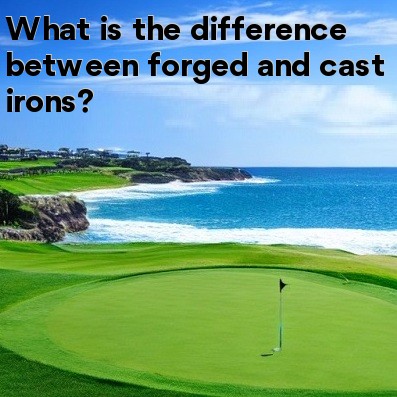
In golf, what is the difference between forged and cast irons?
When it comes to choosing a set of golf irons, one of the key decisions you'll need to make is whether to go for forged or cast irons. Both options have their own unique characteristics and advantages. Let's dive deeper into the differences between forged and cast irons:
- Forged Irons:
- Forged irons are created from a solid piece of metal, usually carbon steel.
- They are made by heating a metal billet and then pounding and shaping it into the desired form.
- The forging process makes the clubhead denser, providing a soft and solid feel on impact.
- Because the metal is compressed, forged irons tend to have a smaller sweet spot compared to cast irons.
- However, skilled players often prefer the feedback and control offered by forged irons.
- Forged irons also allow for easier customization and bending of the clubhead to adjust loft, lie angle, and weight distribution.
- Due to the time-consuming and labor-intensive manufacturing process, forged irons are generally more expensive than cast irons.
- Cast Irons:
- Cast irons are made by pouring molten metal, typically stainless steel or a lighter alloy like aluminum, into a pre-formed mold.
- This process allows for intricate designs and cavity-back constructions to enhance forgiveness and launch characteristics.
- Cast irons have a larger sweet spot, making it easier to achieve optimal distance and forgiveness on off-center hits.
- They generally have a more perimeter-weighted design, which helps in increasing the moment of inertia (MOI) and reducing twisting on mishits.
- The manufacturing process of cast irons is less time-consuming and expensive compared to forging.
- Cast irons can also offer a wider range of options in terms of game improvement features, such as perimeter weighting, undercut cavities, and deep center of gravity.
- While cast irons may not provide the same level of feedback and workability as forged irons, they are often preferred by beginners and high-handicap golfers for their forgiveness and stability.
Ultimately, the choice between forged and cast irons comes down to personal preference and skill level. If you are an experienced player seeking control and feel, forged irons may be the way to go. On the other hand, if forgiveness and distance consistency are your priorities, cast irons might be a better fit.
Remember, it's always a good idea to visit a professional club fitter or golf retailer to get fitted for the right set of irons based on your swing characteristics and individual needs. They can help guide you in making the best choice for your game.





